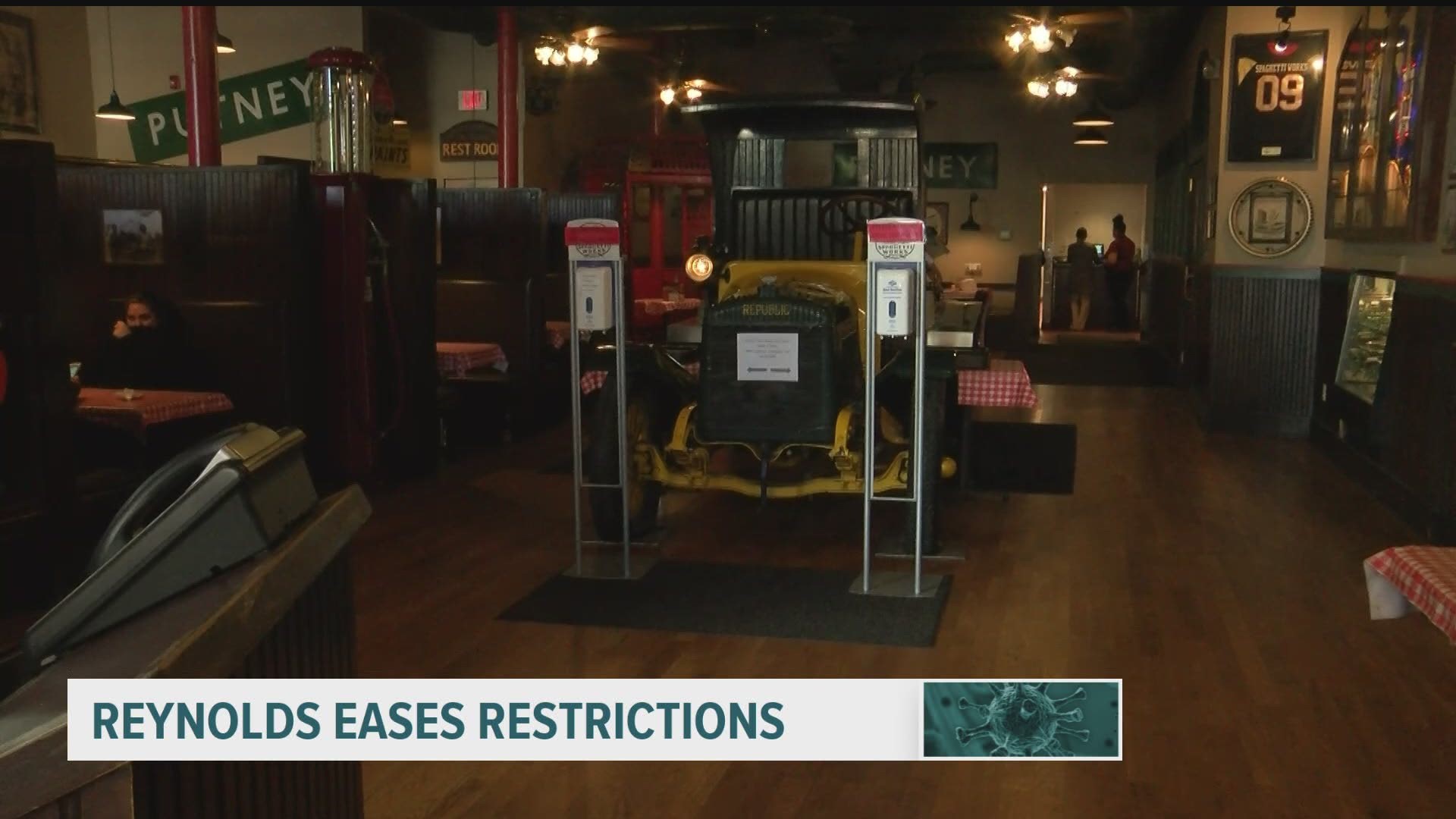IOWA, USA — Gov. Kim Reynolds announced some changes to the state's COVID-19 emergency proclamation Wednesday morning, which includes removing gathering restrictions just before Christmas and New Year's holidays.
The announcement comes as hospitalizations in the state continue to decrease following November's surge.
Tests administered and new cases have also decreased.
The latest proclamation goes into effect Thursday at 12:01 a.m. and will continue through Jan. 8, 2021. While bars and restaurants can operate at normal hours, patrons must continue mitigation efforts, like being seated when eating or drinking and limiting group sizes to eight or fewer people.
Tables must be distanced six feet apart at these establishments and masks are required when patrons aren't seated.
Reynolds also announced loosened restrictions for spectators at youth, high school and adult sporting events. Instead of only two spectators per athlete, the proclamation will allow all household members to watch.
Social distancing and mask-wearing are still required at these events.
The latest proclamation also removes gathering restrictions in the state just over a week before Christmas. Reynolds defended her decision to remove the restriction.
"I think Iowans have stepped up and done the right thing," Reynolds said. "I believe that they'll continue to make the right decision."
"We are so close to seeing the end of this, and I think they know that. They see that there is a light at the end of the tunnel and they recognize the fact that they just need to hang on a little bit longer."
Reynolds noted that she will "dial back up" restrictions if hospitals aren't able to meet the needs of Iowans. Masks requirements put in place are still being enforced.
Local 5 reached out to Reynolds' communication director Pat Garrett for more clarification on whether or not social distancing is required for gatherings. Gatherings won't have a guest limit as long as they are able to socially distance themselves.
If someone chooses to have a Christmas party with members of their family that live outside of their home, they must practice social distancing, according to Garrett.
On Monday, 2,000 Pfizer-BioNTech COVID-19 vaccines arrived at Iowa hospitals for workers to get vaccinated. Reynolds said approximately 500 health care workers have received the vaccine as of Wednesday.
The state's coronavirus website will keep track of how many vaccines have been administered on Iowans, Reynolds announced. The Iowa Department of Public Health (IDPH) is working to create the dashboard.
Until it is ready, the state will continue to update Iowans via social media and press conferences.
Reynolds also said she will be vaccinated following health care workers
By next Monday, Iowa could receive its first shipment of the Moderna COVID-19 vaccine, according to Kelly Garcia, interim director of the IDPH.
"This is all great news," Garcia said. "However, I want to caution that we are still in the very early stages where supply is limited and understandably Iowans want to know what we expect next, and who will follow the initial priority group of health care workers and long-term care residents and direct care staff."
Garcia said the Infectious Disease Advisory Council (IDAC) is working to develop guidance on vaccine distribution and prioritization. The group has met twice to discuss who will get the vaccine after hospital staff, long-term care residents and those who care for them.
IDAC is finalizing the recommendations and is expected to release them next week, according to Garcia. The next priority will be focused on work settings, like schools, food suppliers and correctional facilities.
"I'm tremendously thankful to our IDAC members who are taking these conversations head-on, speaking freely, bringing their expertise to the decision-making process, because these decisions cannot be made lightly, or easily," Garcia said.
The governor's office announced this week they will be returning $21 million of CARES Act funding after the Treasury Department said the state cannot use it to pay for IT infrastructure upgrades.
The funds were allocated to pay for the state's contract with Workday, a cloud-based system used for human resources, finance and planning in the state government.
The state already spent $4.45 million on the project.
During the press conference, Reynolds said her administration has a plan to reallocate the $21 million and that she hopes the federal government will extend the Dec. 30 deadline to use the funds.
Tuesday evening, the Associated Press reported Reynolds' administration is using $10 million in CARES Act funds to pay salaries of state police officers, who have not been directly involved in the state's response to the pandemic.
According to the report, the expense is listed in a state report as going towards "State Government COVID staffing" at the Iowa Department of Public Safety.
The report says the money will support payroll expenses for employees "whose services were diverted to a substantially different use as a result of COVID-19."
Related Stories
- Polio parallels: Iowa survivors find similarities between polio and COVID-19 vaccine more than 60 years later
- Negotiators near agreement on second stimulus check in long-delayed COVID-19 aid bill
- Your top questions about the coronavirus vaccine, answered
- CDC to use text message tool to track COVID-19 vaccine side effects
- FDA allows use of over-the-counter home test for COVID-19
- City of Des Moines extends limitations on public outdoor events

